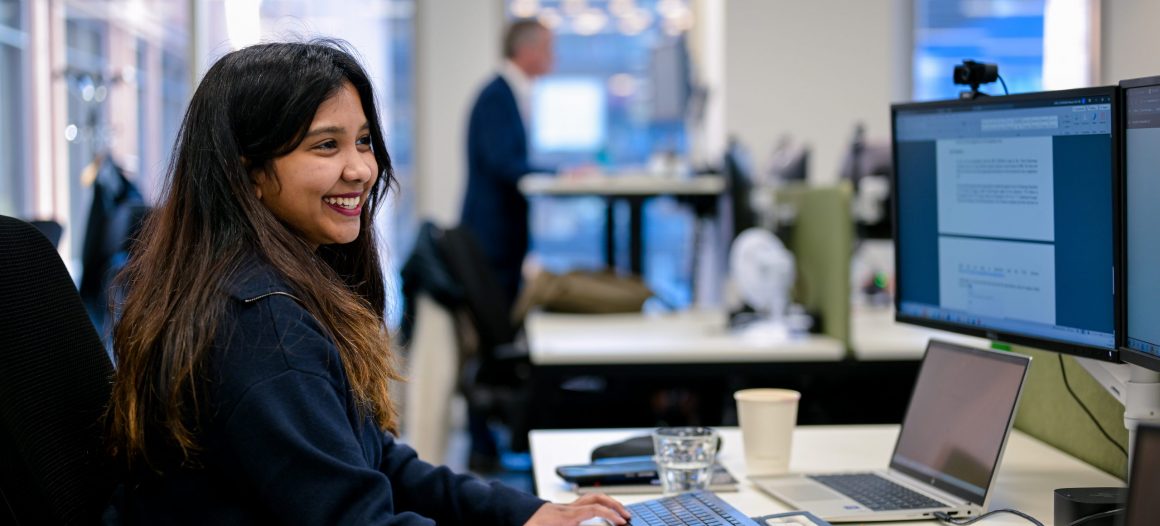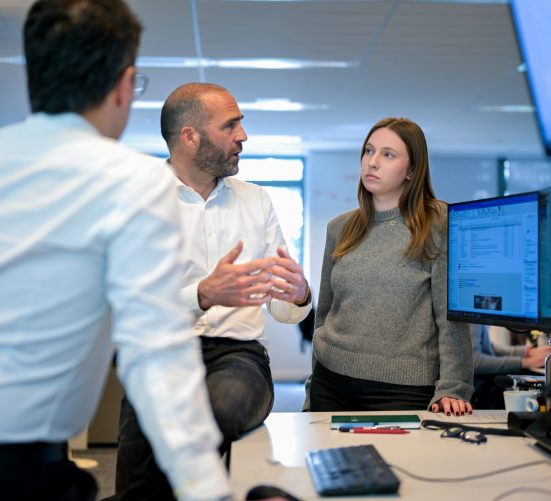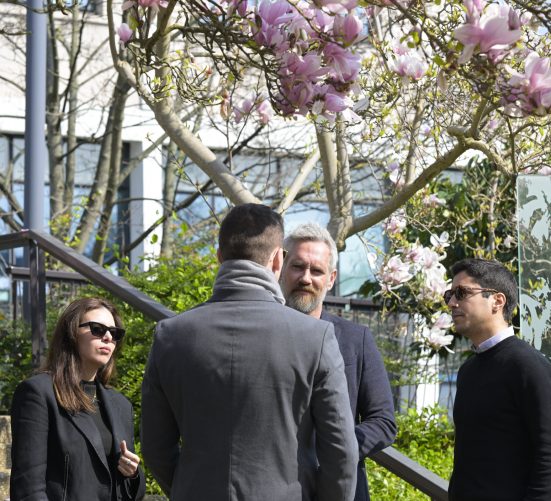Implementing our Human Project

Crédit Agricole CIB is driving a managerial and cultural transformation by creating a work environment that fosters autonomy, collaboration, trust and initiative. Our goal is to enhance accountability and commitment among our employees to better serve our clients and society.
Our accountability process
In 2020, Crédit Agricole CIB launched an accountability process, a key part of its Human Project, involving employees, managers and senior management, in order to support its growth and maintain a high level of internal engagement. This accountability process continued and was rolled out in 2024. All business lines are now on board, mainly in Europe (with France, the United Kingdom, Germany, Italy, Spain and the Nordic countries), but also in the United States and Asia-Pacific.
additional employees joined the accountability process in 2024
Promote skills development and ensure career progression
As a responsible employer, Crédit Agricole CIB regularly offers its employees dynamic and innovative career paths to develop their skills. The Human Project empowers everyone to actively shape their career through comprehensive training, enhancing both managerial and business expertise and skills. This initiative aims to foster sustainable employability, increase the performance of employees and the Bank, and position Crédit Agricole CIB as a more attractive employer.
Since 2024, thanks to a unique partnership with LinkedIn, Crédit Agricole CIB has provided its employees with an international training and learning platform: LinkedIn Learning. This partnership offers employees unlimited access to nearly 22,000 training courses in 24 languages, empowering them to take responsibility for developing their own potential on a wide range of topics and skills.
Several business-specific training modules are also available and offered to encourage upskilling on cross-functional themes. For example, the Risk Academy is accessible to all Crédit Agricole CIB employees, though it is primarily designed for those in the Risk division and the most exposed business lines. It aims to strengthen the risk culture by explaining all the types of risks associated with different activities. In 2024, around one hundred employees worldwide followed four new classes in this training course. The Project Academy promotes skills development in project management methodology, while the Management Academy aims to develop a shared managerial culture within the Bank. Lastly, the ESG Academy educates employees on Corporate Social Responsibility and deepens their understanding of sustainability challenges.
For the past two years, Crédit Agricole CIB has also provided all its employees (including trainees and work-study students) with access to a digital career and skills management solution called 365Talents. This platform enables all employees to showcase their experience, skills and career aspiration, view colleagues’ profiles and competencies and access artificial intelligence generated suggestions for internal opportunities within the Group, based on skills matching.

Assess employees’ accountability
To meet the challenges of accountability and digital transformation, since 2022, Crédit Agricole CIB has offered an accountability assessment via the Crédit Agricole Group application MyDev. This application enables employees to perform a self-assessment and thereby take an active role in their appraisal. They also have the opportunity to request non-anonymous feedback for a 360° feedback across various business units, enriching discussions with managers during appraisals and supporting a continuous improvement approach. MyDev fosters more regular dialogue, individualised support and enhanced professional development.
The Accountability Index (IMR) measures the cultural and managerial transformation and enables us each year to monitor the implementation of the Human and Societal Projects, as part of the 2025 Ambitions medium-term plan. It also provides the opportunity to measure employees’ adherence to new social, societal and environmental commitments. The survey was carried out among employees in France and abroad for the third year in a row. It measures employee’s understanding of Crédit Agricole CIB’s strategy and its role as “an actor of a sustainable society”.
An active policy encouraging diversity and inclusion
Diversity is a major component of Crédit Agricole CIB’s identity. Our team comprises members from over 100 different nationalities, working across 30 countries worldwide. Promoting the diversity of career paths, experience, skills and uniqueness is at the heart of our human commitments and is also part of the Group’s strategy of universality.
Two key annual events are organised: Diversity Month in November and Diversity Week in March. These are essential opportunities to raise awareness and engage with our employees. These initiatives include opportunities to discuss diversity and inclusion through conferences, information materials, events and the participation of Executive Committee members and role models.
In 2024, Crédit Agricole CIB organised the “Diversity fresk”, an interactive workshop that encourages employees to examine their own biases and stereotypes related to ethnicity, origin, gender, disability, etc.
Diversity as a performance driver
Firmly believing that diversity is a powerful driver of performance and innovation, Crédit Agricole CIB has proactively fostered a more inclusive corporate culture over the past several years. To promote professional equality and diversity, we have implemented for several years actions to ensure balanced recruitment and equal pay, as well as providing training and raising employee awareness of the principles of professional equality and non-discrimination. We are committed to supporting all our employees in developing their employability and enable them to benefit from initiatives to promote parenthood.

A model of inclusion for all generations
Inclusion and equal opportunities are also reflected in Crédit Agricole CIB’s commitment to young people in the Crédit Agricole Group’s “Youth Plan”. The most visible impact of this initiative is the increase in the number of interns and work-study trainees recruited in France. In 2024, 477 trainees, 302 work-study employees and 71 volunteers under the VIE scheme (a programme to enable young people to perform international missions) joined our teams.
Crédit Agricole CIB identifies the highest-potential employees from amongst its trainees, work-study employees and VIE volunteers to build a talent pool known as the Global Junior Pool. In 2024, nearly 60% of junior positions (from zero to two years of experience) in France were filled by young people coming from this pool. Older employees also benefit from specific support measures.
of junior positions (0-2 years of experience) were filled by young people coming from the Global Junior Pool
Raising employee awareness and training on disabilities
Crédit Agricole CIB pays particular attention to raising employee awareness and training on disabilities to combat discrimination and stereotypes. For many years, we have communicated and raised awareness among employees through the Diversity Month and have participated in European Disability Employment Week (EDEW). This year, for the second year in a row, we organised DuoDay in France: for one day a person with a disability shadows a volunteer employee to learn about a job in the company in an immersive experience. This is a rewarding professional and human experience. Each person hosted during DuoDay 2024 received an offer from Crédit Agricole CIB for a permanent contract, work-study contract or internship.

Employee engagement in society
We support various causes through our “Solidaires By Crédit Agricole CIB” programme.
For around 15 years, we have worked alongside AFM-Téléthon in its research against rare diseases. Our teams in France and internationally also participate in the Financial Community Telethon (TCF).
For the past three years, Crédit Agricole CIB has put in place an initiative called “Solidarity Week”. From New York to Hong Kong, from Paris to São Paulo, more than 30 initiatives were carried out in collaboration with partner NGOs in 2024, to support people in need. For example, employees helped prepare and distribute meals for disadvantaged people in New York, Houston, Hong Kong, Taiwan and London, as well as in Japan, Italy and Spain. Collections of food, money, clothing and toys for hospitals and charities were organised around the world.
As part of the Coups de Pouce Solidaires programme, employees are invited each year to present charitable initiatives in which they are involved in the areas of solidarity and social inclusion, the environment, education, health and culture. Crédit Agricole CIB provides financial support to selected projects. In 2024, eleven community projects around the world received financial support.
Payroll giving allows employees in France to make a monthly donation, 100% matched by Crédit Agricole CIB, to one of the following organisations: Hôpital Necker-Enfants malades, Institut Curie, Entourage, Cartable Fantastique, Pure Ocean. This programme also exists in the United Kingdom.
Skills volunteering enables employees to devote their time and/or skills to an organisation and a specific assignment.
In 2024, we contributed to the Group’s charity initiatives through its three foundations: Crédit Agricole Solidarité et Développement, Fondation Pays de France and FARM. We have also supported the Plastic Odyssey expedition since 2019, focusing on environmental protection and financial inclusion and offering alternatives to plastic consumption.
Outside France, Crédit Agricole CIB has developed long-standing partnerships with non-profits striving for social inclusion, such as The Bowery Mission and New York Cares in the United States. In the United Kingdom, the Bank helps combat poverty, instability and exclusion through its Charity programme. In Italy, Crédit Agricole CIB supports Save the Children, which seeks to ensure that children around the world have access to care, food, shelter and education. It also supports Banco Alimentare, which collects and distributes food to those most in need. In Hong Kong, we support Feeding Hong Kong, which avoids food waste by redistributing food to charities.

